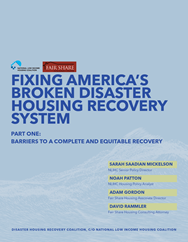NLIHC and Fair Share Housing Center of New Jersey Release Part I of ‘Fixing America’s Broken Housing Recovery System’
Oct 28, 2019
NLIHC and the Fair Share Housing Center of New Jersey released on October 25 Fixing America’s Broken Disaster Housing Recovery System: Part 1: Barriers to a Complete and Equitable Recovery identifying the tremendous barriers to a complete and equitable housing recovery for disaster survivors with the lowest incomes, including people of color, seniors, people with disabilities, people experiencing homelessness, people with limited English proficiency, and others.
Read Fixing America’s Broken Disaster Housing Recovery System: Part 1 Here

America’s disaster housing response and recovery system is broken and in need of major reform. When disasters strike, the lowest-income survivors are often hardest hit, have the fewest resources, and face the longest, steepest path to recovery. Despite the clear need, federal efforts frequently leave these survivors without the assistance they need to get back on their feet and leave their communities less resilient to the next disaster. The result is a disaster housing response and recovery system that exacerbates and reinforces racial, income, and accessibility inequities at each stage of response and recovery.
To address these systemic challenges, NLIHC and our Disaster Housing Recovery Coalition of more than 850 local, state, and national organizations is holding a policy convening of a small subset of key, representative stakeholders to reimagine a new federal disaster housing response and recovery system that is centered on the needs of the lowest-income survivors and their communities. The convening will be held this week in Houston, Texas.
This paper – drafted primarily by NLIHC and the Fair Share Housing Center of New Jersey with additional contributions by DHRC members Texas Housers and the Community Justice Project – sets the stage for the policy convening. The paper is largely based on the experiences and expertise of DRHC members, including many working directly with disaster-impacted communities and with first-hand experience recovering after disasters. By identifying the failures of the current disaster housing response and recovery framework, this paper can help ensure robust policy discussions at the convening are focused on developing a new vision for disaster housing recovery – a vision that places the housing needs of the lowest-income survivors, including people of color, people with disabilities, and others, at its center.
Part II of this paper, including concrete recommendations to redesign our country’s disaster housing recovery and rebuilding system, will be published in early 2020.
Read the report at: https://bit.ly/2p0viO1
Learn more about the Disaster Housing Recovery Coalition and get involved: https://bit.ly/2NOHusW